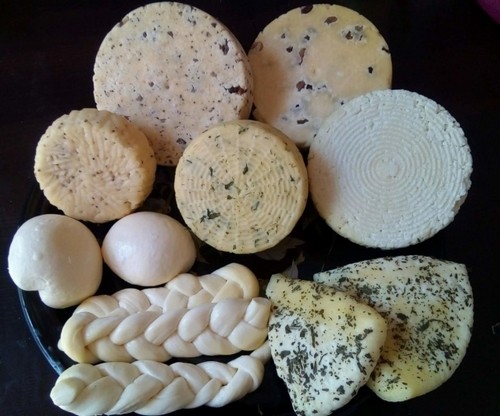Dairy products, including milk, yogurt and cheese, should not be too acidic, so as not to irritate the mucous membrane. They are well tolerated and do not worsen the symptoms of gastritis. However, whenever possible, it is recommended that low-fat varieties be selected.
If you do not tolerate dairy products or prefer to avoid them, you can choose vegetable milk instead, such as calcium-fortified soybeans, rice or almond milk, for example, the Joya brand .
People often ask the question: is it possible to eat cheese with gastritis? I will answer: everything always depends on the features of the human body and its perception of certain products. But, let’s understand in more detail.
Gastritis is an inflammation of the stomach that is accompanied by high acidity and can cause pain. Gastritis is usually caused by internal infection, drugs, stress, or autoimmune problems. Treatment of gastritis is focused on treating the underlying cause and eliminating the so-called irritant. It is important to understand that dietary changes can help deal with some of the discomfort associated with gastritis.

Digestive Disorders and Lactose
Although cheese is safe to eat, sometimes some people have difficulty digesting it, resulting in stomach pain or bloating. Pain or digestive problems after eating cheese can be caused by a symptom of lactose intolerance, which is one of the main causes of indigestion after eating cheese.
Lactase deficiency (the digestive enzyme needed to break down lactose, the natural sugar found in milk and dairy products), your body cannot properly digest cheese. Lactose intolerance can also be caused by poor absorption, which causes lactose to pass into your colon without being digested, causing gas, bloating, and stomach pain. Therefore, from all of the above, you can use quite a lot of dairy and soy products, but, of course, of high quality, without GMOs and without the use of gene enzymes.

An important role is played by the quality of storage and export of goods, which is always violated when importing unofficial products into Ukraine. This is a very common occurrence, and when choosing cheese, you should be especially careful about this issue. Yes, these products will cost less, but the scale of harm that smuggling can do is much more.
And what is useful in cheese?
- Protein
- Minerals: calcium, phosphorus, sodium, iodine, potassium, zinc, etc.
- Amino acids: tryptophan, methionine, lysine and others
- Vitamins: A, thiamine (B1), riboflavin (B2), B5, B12, D, E, C, PP
- Extractives
The beneficial substances that enter the body when eating cheese are absorbed much better than from ordinary milk. But at the same time, the calorie content of the fermented milk product is much higher. Its indicator depends on the type of cheese and the fat content of milk used in its manufacture. It is true that without cheese you can’t get a full and balanced diet. But there are still some limitations in gastrointestinal diseases.
What cheeses should not be consumed by people with gastritis:
- sharp cheeses;
- cheese with pepper;
- cheese with sourness and a lot of salt,
- processed cheese;
- sausage, smoked cheese;
- suluguni, feta cheese
- goat cheese, due to pronounced high acidity.

Regular hard cheese can be used for gastritis with high acidity, but not earlier than on the fifth day after the day of exacerbation and in relatively small quantities.
Fresh cheeses come first
With gastritis, preference is given more to fresh varieties of cheese, such as Ricotta, Mascarpone, Mozzarella, Feta. In addition, blue cheese is not prohibited – however, the store must make sure that such a product is not expired. Blue cheeses have an astringent property that helps create a protective membrane for your stomach. And we must not forget that the amount of cheese consumed in gastritis should not exceed 100 grams. – This is a few slices per day.
What cheeses can and should be consumed with gastritis:
✔ Mold cheese contains Penicillium Camamberti, Penicillium glaucum, Penicillium roqueforti. Due to the bacteria and enzymes necessary for the normal functioning of the digestive tract, it is not only possible to take this beneficial product with gastritis and gastric ulcer, but it is also necessary. Specifically appreciated by Roquefort, Gorgonzola, Bavaria Blue and Bree, they are distinguished by pronounced bactericidal qualities and an enveloping effect.
✔ Mozzarella, Ricotta, Moscarpone. These copts, which are distinguished by a fairly dense solid mass, do not contain any spices in them, they cannot be smoked.
✔ Feta. Due to the large number of useful bacteria, it is recommended for the treatment of the stomach with different acidity. There are no contraindications regarding the use of Feta.

✔ Hard varieties with a fresh taste and without adding a smoking effect. They have a positive effect on blood pressure differences. Parmigiano Rigiano, Grano Padano and preferably in grated form.
✔ Tofu.
✔ Semi-hard varieties of cheese, characterized by a soft, not spicy taste, and most importantly natural. By no means a cheese product. For example, such as Amadeus, Tyroler Adler, Emmentaller, etc.
In any case, remember that cheese is only a participant in the diet, the doctor prescribes the main treatment. Do not neglect this. Eat cheese and be healthy.



